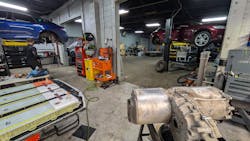The Ohio Shop That Exclusively Services Electric Vehicles: Great Lakes EV
Electric vehicle service is something repair shops across the U.S. are either considering or have already started integrating. However, many worry if there is enough demand for EV service yet.
Great Lakes EV in Dayton, Ohio, isn't having this problem. The shop has a sole focus on electric vehicles.
Launched just last year, the business is the product of Suzi Milo's career with Tesla and Pete Milo's experience in electronics and computer programming. This culminates in an innovative duo defining what EV service looks like in the aftermarket.
A Tesla Expert and an Electronics Whiz
Pete actually did not get his start in automotive but in the entertainment industry, working in lighting design. From there, he went to work in an area referred to as "architainment," where he handled power control systems, custom lighting systems, designed electronics, wrote software and troubleshoot obsolete power control systems for more than a decade.
"So really an eclectic electronics and troubleshooting background," Pete says.
His interest in electronics has branched into automotive before, though. His father, an aircraft mechanic, worked with him on a myriad of different projects.
"My dad and I did Subaru swaps and old Vanagons, and I daily drove stupid stuff, like an old MGB," Pete recalls.
While Pete had much experience working with electronics, Suzi brought to the table an extensive career with Tesla, working in sales, delivery and service for nearly eight years, with duties split between individual contributor positions and leadership roles.
It was during her time at Tesla that she would sometimes encounter diagnostic issues her colleagues were struggling to resolve. She would often present the problem to Pete, who would manage to figure it out, leading Suzi to realize just how valuable his technological skill set is in the world of EVs.
"Pete would just solve it, out of nowhere. He'd be like, 'Well, did they try this?'" Suzi says. "He has this skill set that works very well with the architecture of these cars."
Finding a New, Better Way for EV Service
As the end of her tenure at Tesla approached, Suzi had discussed the possibility of her and Pete opening their own auto repair shop together. When she retired from her role in April 2024, they took the leap and pursued shop ownership.
There wasn't much debate about what kind of shop they would be operating. From the get-go, they were on the same page about just wanting to service EVs. As Suzi explains, it simply made the most sense with the experience and talent she and Pete were bringing to it.
"We wouldn't be in the automotive industry in any other capacity. We have classic cars kind of as weird side projects—but it wasn't a matter of, 'Hey, we want to open a shop. What kind of shop do we want?'" Suzi says. "It was, 'Hey, we have this EV skill set and industry knowledge. How do we leverage it now that I'm not at Tesla?'"
Having been in business for just a year, Great Lakes EV is still rapidly evolving. For the past nine months, they've operated out of a rented 6,000-square-foot warehouse space, equipped with one bay. The Milos specifically selected this location over something more common, such as a three-bay garage, due to the need for greater internal space when working with EVs.
"When you're removing a battery pack, you have to have an area almost as big as the car to pull that pack back out and maneuver it into another location to work," Pete explains. "I can imagine trying to do that somewhere more traditional, like the chains that have a row of garage bays with one lift per garage bay. And it wouldn't really work, because then you'd be taking packs outside. And if it's raining or cold ... no, you gotta keep that inside."
As they develop the shop, Suzi and Pete have co-opted the "first principals" method promoted by Elon Musk, which entails adopting what has been working in the industry and looking for ways to improve things that aren't.
"We've been evaluating every decision from that perspective, and not just doing something because that's the way it's always been done," Suzi says.
Possibly the biggest example of this is how Pete has developed all the shop's internal software, consisting of their own custom inventory system for parts and a custom ticketing system, all connected to the same database. It was their answer to existing commercial products not offering them exactly what they needed.
Pete saw a way for the shop to utilize old Tesla software, identify the needed specifications and order the serial hardware from China, rather than spending the money on an expensive scan tool.
"It's basically all dongles, cables and laptops. We don't even really use traditional scan tools. They're just not useful to us," Pete says.
Pete and one of the shop's technicians even work together to construct custom tools unique to Great Lakes EV's needs, such as motor stands, jigs and extraction tools for bearings.
The shop has learned to be self-reliant and highly innovative as it seeks to pave a new path and fill a gap in EV service that OEMs can't accommodate. This largely involves work on motors and batteries, as well as an entire parts teardown operation that supplies them with parts for older Teslas. This is an especially powerful practice, allowing the shop to keep parts in stock that Tesla itself does not even have on the shelves.
Suzi and Pete are looking to make a greater impact beyond just launching a successful shop. They want to play a role in preparing the industry at large for EV service, with plans to conduct both front- and back-of-house training in EV service for other shops.
Ultimately, vehicles are more electric and digital than ever. Even internal combustion engines are adopting complex electronic systems that technicians and shops will have to be ready for. The Milos realize that there is a compounding need for more individuals who can not just handle these vehicles but who can see ways to innovate processes as well.
"The biggest gap is that these skill sets are actually very, very different. And we're trying to get creative about how to recruit people in the IT side of things, the electronic side of things, and not just the traditional automotive background—and then how do we give back to the community and bring more of these skills to the auto industry?" Suzi says. "It's a really big puzzle."
About the Author
Kacey Frederick
Associate Editor
Kacey Frederick joined as the assistant editor of Ratchet+Wrench in 2023 after graduating from the University of Arkansas at Fort Smith with a bachelor’s in English and a minor in philosophy.
The grandchild of a former motorcycle repair shop owner, he’s undergone many trials and tribulations with vehicles. Now the proud owner of a reliable 2011 Toyota Camry, he works to represent those in the repair industry that keep him and so many others safely rolling on.

